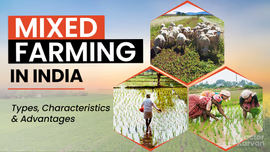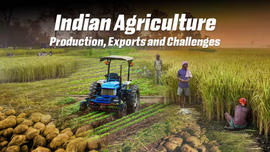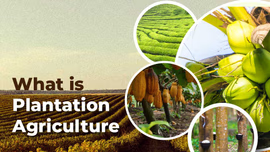What is Organic Manure: Meaning, Types and Importance in India

Table Of Content
- Introduction
- What is Manure
- What are the Primary Sources of Manure
- Types of Manures
- Advantages of Manure
Introduction
Organic farming is becoming a popular farming activity because it is beneficial for our health and environment. Organic manure is a major part of organic farming as it involves the use of organic manure to make the soil ideal for crops and supports sustainable farming practices.
In this blog, we will discuss the meaning of manure, its types, and advantages.
What is Manure?
Manure is the decomposed material produced from animal and crop residues. It enhances soil productivity and is a natural, cost-effective fertiliser, also termed organic manure. Organic manure is rich in phosphorus, nitrogen, and potassium. They are better in the long run and do not cause pollution. It is a precious and renewable source that improves soil quality without disturbing the environment.
What are the primary sources of Manure?
Manures can be extracted from different sources, some of which are listed below:
- It can be derived from agricultural industry by-products, such as fruit and vegetable processing waste, bagasse and press mud, oil cakes, etc.
- It can be prepared from cattle dung and urine, as well as slurry from biogas plants.
- It is produced from the droppings of sheep and goats, as well as poultry jitter.
- Crop wastes such as stubbles, sugarcane trash and other related materials are also sources of organic manure.
- Weeds, water hyacinths and tank slits can help in the preparation of manure.
- The waste from human habitation, such as domestic waste, sewage, sludge, and human urine, is a source of manure.
- Slaughterhouse waste, like fish waste, meat, bones, horn and hoof meat, etc., is one of the primary sources of organic manure.
Types of Manures
Manure can be classified into two types based on the concentration of nutrients. The two types of manures are:
- Bulky Organic Manures
- Concentrated Organic Manures
Bulky Organic Manures
These types of manures consist of small nutrient percentages, and they are used in huge quantities. They are further classified into three types:
Green Manure
Green Manure is a crop specially grown and ploughed to mix into the soil to enhance its fertility and physical structure. It can be formed by growing green manure crops or by collecting green leaves from plants grown in forests, field bunds, and wastelands. The popular green manure examples are sunn hemp, Sesbania rostrata, cluster beans, pillipesara, and dhaincha.
Farm Yard Manure
Farm Yard Manure (FYM) is a decayed mixture of cattle dung and urine with leftover materials from fodder fed to the farm animals. The average composition of FYM is 0.5% Nitrogen, 0.5% K2O, and 0.2% K2O5. It enhances the soil structure and acts as a natural fertiliser in agriculture. The use of FYM helps improve the soil’s microbial activity, water, and nutrient-holding capacity.
Compost Manure
Compost Manure is another type of manure prepared using farm waste materials, animal refuse, vegetable waste, domestic waste, and sewage waste. It improves the water and nutrient-holding capacity of the soil and its structure. It enhances nutrient value and supports the plant’s health.
Concentrated Organic Manure
These types of manures contain higher nutrients than bulky organic manures and are also termed organic nitrogen fertilisers. Examples of concentrated organic manures are fish manure, blood meal, oilcake, and more. The organic nitrogen present in this manure is converted into nitrate nitrogen and ammoniacal nitrogen through bacterial action before it is used by the crops. Thus, these organic fertilisers act relatively slowly and ensure that the supply is available for a longer time.
Advantages of Manure
Organic Manures have several advantages, some of which are listed below:
- They are a good source of macronutrients and supply nutrients to the plants, including micronutrients.
- They enhance the physical properties of the soil, such as water and nutrient-holding capacity, structure, etc., and aerate the soil.
- Carbon dioxide gas is released during the decomposition process and can be used as carbon dioxide fertiliser.
- Organic manures are more cost-effective than chemical fertilisers.
- The use of organic manure ensures healthy crop production.
Conclusion
Manure is a suitable soil amendment that acts as a field residue when used in farming. It can also be a source of income for farmers, as they can sell the manure to those who want to increase their land’s soil fertility. Manure has played an important role in feeding the growing population as it improves soil fertility and increases crop yield.
Farmers are learning the importance of organic manure and using it instead of bad synthetic fertilisers, which is one reason for its increasing popularity. The use of organic manure will make our future more sustainable and stronger.


Related Blogs












